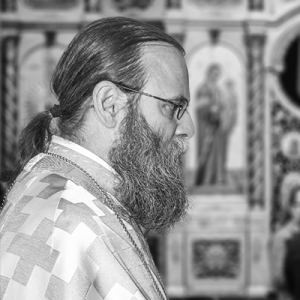“Walking the Talk” — Epilogue Part II
— Fr. Bohdan Hladio
May, 2009 A.D.
High Heels or Hiking Boots?
Thank God, most clergy and faithful are good, humble, pious people trying to do their best in often difficult circumstances. Posturing, slander, backbiting, ego-centredness, self-absorption, self-exaltation and denigration of others are not part of their psychological and spiritual constitution. Such people know that they’re sinners, accept correction when they’re wrong, and know that there is always room for improvement. For them these articles have probably been helpful, though ultimately unnecessary.
If, on the other hand, you’ve read one or another of these articles and thought “This is crazy. Where does he get this stuff from? I’m fine the way I am! I don’t need this!”, then be assured that you are the person these articles have been written for.
Christ calls us to be perfect (Mt. 5:48). Regarding this commandment, C.S. Lewis writes:
“The command ‘be ye perfect’ is not idealistic gas. Nor is it a command to do the impossible. He is going to make us into creatures that can obey that command. He said (in the Bible) that we were ‘gods’ and He is going to make good His words. If we let Him – for we can prevent Him, if we choose – He will make the feeblest and filthiest of us into a god or goddess, a dazzling, radiant, immortal creature, pulsating all through with such energy and joy and wisdom and love as we cannot now imagine, a bright stainless mirror which reflects back to God perfectly (though, of course, on a smaller scale) His own boundless power and delight and goodness. The process will be long and in parts very painful, but that is what we are in for. Nothing less. He meant what He said.”
— Mere Christianity
Though we won’t achieve this perfection here on earth, if we don’t start here we won’t achieve it at all. Our entire “podvih” (spiritual struggle) – our prayers, worship, fasting, deeds of mercy, spiritual reading, etc. – doesn’t so much draw us close to God as open the door so that God might draw close to us. They help us overcome the obstacles between ourselves and God, to “not prevent God from making good on His words”, as C.S. Lewis puts it. Our spiritual discipline and fulfilling of the commandments cleans and polishes the image of God within us, so that He can see Himself clearly in us, and find in our hearts a worthy dwelling place.
All our Christian actions – the “talk” we are called to walk – are ultimately rooted in two fundamental realities; Love for God, and a firm desire to do His will.
These realities are poignantly brought out in a beautiful story from the life of St. Herman of Alaska:
“Once the elder was invited on board a frigate that had come from St. Petersburg. The captain of the frigate was a man quite learned, highly educated; he had been sent to America by imperial command to inspect all the colonies. With the captain were some 25 officers, likewise educated men. In this company there sat a desert-dwelling monk of small stature, in an old garment, who by his wise conversation brought all his listeners to such a state that they did not know how to answer him. The captain himself related: ‘We were speechless, fools before him!’
Father Herman gave them all one common question: ‘What do you, gentlemen, love above all, and what would each of you wish for his happiness?’
Diverse answers came out. One desired wealth, one glory, one a beautiful wife, one a fine ship which he should command, and so on in this fashion.
‘Is it not true,’ said Father Herman at this, ‘that all your various desires can be reduced to one – that each of you desires that which, in his understanding, he considers best and most worthy of love?’
‘Yes, it is so,’ they all replied.
‘Well, then, tell me’ he continued, ‘can there be anything better, higher above everything, more surpassing everything and in general more worthy of love, than our Lord Jesus Christ Himself, Who created us, adorned with such perfections, gave life to all, supports all, nourishes and loves all, Who Himself is love and more excellent than all men? Should one not therefore high above all love God, and more than all desire and seek Him?’
All began to say: ‘Well, yes! That is understood!’ ‘That speaks for itself!’‘And do you love God?’ the Elder then asked.
All replied ‘Of course, we love God. How can one not love God?’‘And I, sinful one, for more than forty years have been striving to love God, and cannot say that I perfectly love Him,’ answered Father Herman; and he began to show how one should love God. ‘If we love someone,’ he said ‘we always think of him, strive to please him, day and night our heart is occupied with this subject. Is it thus that you, gentlemen, love God? Do you often turn to Him, do you always think of Him, do you always pray to Him and fulfill His holy commandments?’
It had to be acknowledged that they did not!
‘For our good, for our happiness’ concluded the Elder, ‘at least let us make a promise to ourselves, that from this day, from this hour, from this minute we shall strive to love God above all, and fulfill His holy will!”
— St. Herman, St. Herman Press, 1989.
Amen!

